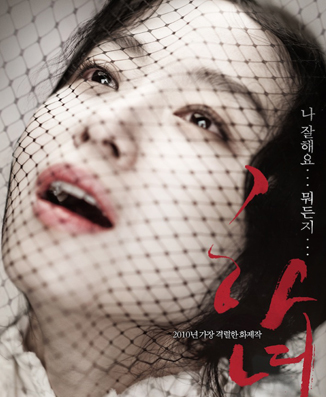Eun-yi (Jeon Do-yeon), a divorcee who works at a food outlet in a busy city thoroughfare, secures the position as junior housemaid to an upper class (and over-privileged) couple, Hoon (Lee Jung-jae) and Hae-ra (Seo Woo), as well as their young child Nami (Ahn Seo-hyeon). On returning from a business trip, Hoon meets Eun-yi for the first time and before long uses his position of power as the master of the household to enter her bed, stirring long forgotten feelings within her. However, as Hoon’s dalliances with Eun-yi increase in their frequency, their liaisons are discovered by the head housekeeper of the family, Byung-sik (Yoon Yeo-jeong), who takes it upon herself to report the affair to Hae-ra’s mother Mi-hee (Park Ji-young). The ensuing battle between the women of the household soon begins to affect Eun-yi’s mental health and, in a last ditch attempt to save her sanity (and finally win the man with whom she has fallen in love), she decides on some drastic action, while each of the other women undertake some twisted steps of their own…
While Im Sang-soo's The Housemaid is a remake of the classic 1960 Kim Ki-young film of the same name, this 2010 version is a very different animal indeed. In fact, Im Sang-soo almost completely rewrites the plot, changing the story of a family destroyed by a predatory seductress (who preys on the base instincts of a, largely innocent, man) into the tale of a rather naive girl who, ensnared by a powerful, womanising male, ultimately pays the price for her brief sexual pleasure at the hands of the family's spoilt and manipulative women.
The majority of The Housemaid is set within Hoon and Hae-ra's mansion - the most expensive set in the history of Korean film - and while the stunningly lavish and sprawling design results in visuals which are utterly sumptuous (to say the least), it is sadly at the expense of the almost palpable feeling of claustrophobia so prevalent in the original production.
The sexual content is also majorly racked up (not that surprising, considering the fact that the original film was made over fifty years ago), reaching a similar intensity to that found in films such as A Good Lawyer's Wife (also directed by Im Sang-soo) and resulting in the film being given a Category III rating on its cinema release. However, the frankly graphic scenes do play an important part in the plot and also serve to add a contemporary edge, subconsciously in viewers' minds, to scenes which would otherwise feel almost timeless.
From the outset of the film, showing the suicide of a young (unnamed) woman from the roof of a bar/restaurant, while revelers party inside and food stall workers go about their nightly business in the thoroughfare below, The Housemaid contrasts the worlds of the haves and have nots in Korean society, and while the differences play somewhat to extremes as the plot progresses, they nonetheless allow the underlying themes to be deftly addressed:
 |
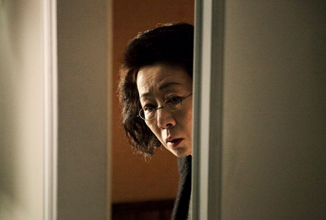 |
Hoon is man who is clearly used to getting exactly what he wants. A successful businessman (the actual nature of his business is neither discussed nor necessary to the plot), who lives a life where money is no object and people are of little importance, other than being required to, unquestioningly, service his various needs. On his return from a business trip, he finds that Eun-yi has been installed as the family's housemaid, and his obvious instant attraction to her, combined with her subservience within her job requirement of "attending" to the master of the house, leaves him in no doubt whatsoever that he is well within his rights to enter her bed, in spite of the fact that his spoilt, vacuous wife is pregnant with his child. The idea that there may be consequences to his actions never enters his head until the resultant fallout starts to become apparent, and only then is he finally forced to rethink his previous assumptions - to a degree at least - and begin to see those around him as they really are.
How much this reassessment affects his later actions is pivotal to his story arc and ultimately shows the type of man he really is, and always was, at heart.
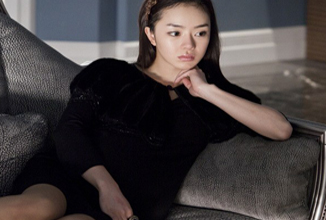 |
 |
Conversely, Eun-yi has never been in this type of situation before, or been surrounded by so many individuals who do whatever they want, whenever they want with next to no regard for the effect of their actions on others. As such, once Hoon makes his intentions clear, she can be forgiven for mistaking his lascivious, controlling approaches as displays of genuine feelings, and one assumes that her hope and belief that their encounter is based on burgeoning love negates any need for her to fear that her sins may be found out.
Without hesitation, she seizes the opportunity for an illicit liaison with both hands (so to speak), unthinkingly assuming that what others don't know won't hurt them, and consequently sets in motion a chain of events which see her increasingly becoming a victim to her naivety, her lack of experience in dealing with such self-serving individuals, and her underlying need for someone to care about (and for) her.
The eventual uncovering of her indiscretions hits her in a completely different way to Hoon and though she, initially, believes that she is up to the fight that is sure to ensue, she must soon face the fact that, in life, when situations of good versus evil arise, good all too often falls.
Eun-yi's ultimate ally in her trials turns out to be the last person she (or viewers) would ever have expected and clearly shows that only "real" people can ultimately be relied upon to weigh up a situation in a rational and unbiased manner.
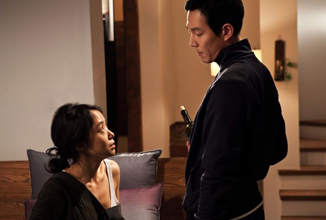 |
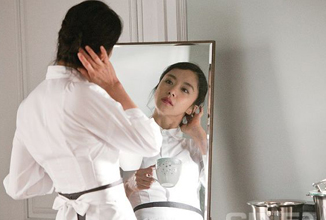 |
Though Eun-yi's problems stem from both thinking that she can have her cake and eat it, and her inability to foresee the creation of a can of worms just bursting to open, once brought into play they are wholly driven by the petty vengefulness and vindictiveness of Hae-ra and her mother. Of course, it is entirely understandable that they would want to make Eun-yi pay for what she has done, but their choice of actions speaks volumes about their spoilt and over-privileged lives and the cavalier, dismissive attitude they have to those whom they deem to be of lesser standing, and less importance than themselves. In fact, even as they outwardly, and repeatedly, exude pain and suffering, it is abundantly clear that they are taking an almost perverse pleasure in making Eun-yi truly suffer and will stop at nothing until their twisted enjoyment is completely fulfilled, i.e. when Eun-yi's life is utterly destroyed.
This all-female battle rages with increasing intensity as the film reaches its climax, and though the rather surreal conclusion is largely played for effect (and, to an extent, shock value), the ongoing social commentary is still successfully underlined.
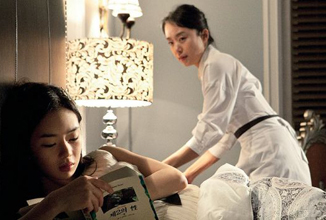 |
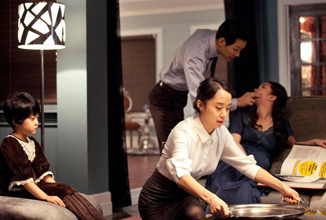 |
Cast:
It almost goes without saying that Jeon Do-yeon gives an exemplary performance as Eun-yi and, while her character may be lacking the depth of some of her other recent roles (Secret Sunshine comes screaming to mind) she still effortlessly manages to create a portrayal which begs viewer empathy and places our allegiances firmly with her character throughout the entire film.
Lee Jung-jae, Seo Woo and Park Ji-young (as Hoon, Hae-ra and Mi-hee, respectively) have somewhat less involved roles to play (especially considering that Lee Jung-jae and Park Ji-young only appear for around half of the film's running time) but all perform admirably, lifting the level of this already polished thriller to a noticeably higher level.
Seo Woo's youth and inexperience does show on a couple of occasions, for example her slightly over-exaggerated eye movements (watch the film and you'll see why I mention it), and though her performance never quite reaches the heady heights of her work in Paju, she largely manages to hold her own against, possibly, the best Korean actress of the present day - Jeon Do-yeon, of course.
However, the biggest surprise, in terms of the cast, comes in Yoon Yeo-jeong's portrayal of Byeong-sik - the older housekeeper and Eun-yi's immediate superior. Her performance is astonishing, to the extent that she comes exceedingly close, on many occasions, to taking Jeon Do-yeon’s limelight, and increasingly gives her a run for her money as the film progresses.
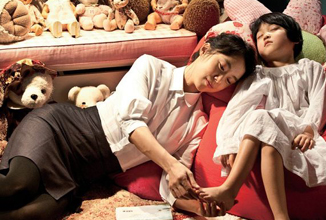 |
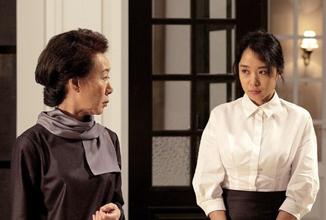 |
Summary:
How viewers ultimately relate to The Housemaid is largely dependent on whether they have seen Kim Ki-young's 1960 masterpiece. Those who haven't will find a sumptuous looking, exciting thriller which easily holds the attention from start to finish, while those who have seen the "original" will find it almost impossible not to make comparisons between the two films and may mourn the loss of the deeply subtle, yet perfectly stated, critique of the increasing disintegration of family values.
In short, though not as subtly stated, socially accurate, or downright claustrophobic and creepy as its illustrious predecessor, The Housemaid still stands its ground as a well realised and gripping thriller which deftly shows that power can easily become as addictive as a drug.
The Housemaid screens at the 2021 London Korean Film Festival on 17 November at Genesis Cinema.
Booking and further information:
https://www.koreanfilm.co.uk/events/the-housemaid/
You can also read the 2010 Hangul Celluloid interview with director Im Sang-soo at:
http://www.hangulcelluloid.com/imsangsoointerview.html
Cast (Actor… Character)
Jeon Do-yeon… Eun-yi
Lee Jung-jae… Hoon
Seo Woo… Hae-ra
Yoon Yeo-jeong… Byeong-sik
Ahn Seo-hyeon… Nami
Park Ji-young… Mi-hee
DVD
The DVD edition reviewed here is the Korean (Region 3) PRE.GM 2-Disc Limited Edition First Press edition, which comes in deluxe packaging with stunning artwork (including an inlay card) both inside and out. The film itself is provided as an anamorphic transfer with an aspect ratio of 2.35:1 and there are no image artifacts (and no ghosting) present. The picture is absolutely exemplary and compliments the beautifully rich visuals perfectly.
All in all, this is yet another example of the superb quality DVD releases which have been regularly coming out of Korea in recent years.
The original Korean language soundtrack is provided as a choice of Dolby Digital 5.1 and Dolby Digital 2.0 and is easily equal to the superb image quality present. The musical score is also well balanced and noticeably nuanced throughout.
Excellent subtitles are provided throughout the main feature but English-speaking viewers should note that, as with many Korean DVD releases, there are no subtitles available on any of the extras.
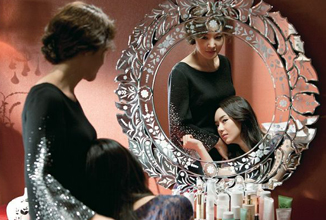 |
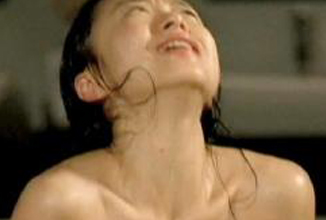 |
DVD Details:
• Director: Im Sang-soo
• Format: NTSC, Anamorphic, Widescreen, Subtitled
• Language: Korean
• Subtitles: English/Korean
• Sound: Dolby Digital 5.1, Dolby Digital 2.0
• Region: Region 3
• Aspect Ratio: 2.35:1
• Number of discs: 2
• Classification: Category III (Korean Film Classification)
• Studio: Pre.GM
• Run Time: 105 minutes (approx.)
DVD Extras:
• Audio commentary
• Making of featurette
• Character featurettes
• Footage from the Cannes Film Festival
• Outtakes
• Trailers
|
















